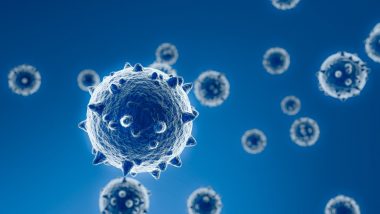London, Apr 17: The risk of rare blood clotting following the COVID-19 infection is around 100 times greater than normal, several times higher than it is post-vaccination or following influenza, according to a new University of Oxford study published on Thursday.
The research found that the rare blood clotting known as Cerebral Venous Thrombosis (CVT) is more common after COVID-19 than in any of the comparison groups, with 30 per cent of these cases occurring in the under 30s.
Compared to the current COVID-19 vaccines being administered, this risk is between 8-10 times higher, and compared to the baseline, approximately 100 times higher.
The study follows reports of possible links between the Oxford/AstraZeneca vaccine and rare cases of CVT, which are undergoing deeper investigations by the medicines regulators even as the jabs have been ruled as safe and effective.
“There are concerns about possible associations between vaccines and CVT, causing governments and regulators to restrict the use of certain vaccines. Yet, one key question remained unknown: ‘What is the risk of CVT following a diagnosis of COVID-19?',” said Paul Harrison, one of study authors as Professor of Psychiatry and Head of the Translational Neurobiology Group at the University of Oxford.
“We've reached two important conclusions. Firstly, COVID-19 markedly increases the risk of CVT, adding to the list of blood clotting problems this infection causes.
“Secondly, the COVID-19 risk is higher than we see with the current vaccines, even for those under 30; something that should be taken into account when considering the balances between risks and benefits for vaccination,” he said.
The study authors, led by Professor Harrison and Dr Maxime Taquet from Oxford University's Department of Psychiatry and the NIHR Oxford Health Biomedical Research Centre, counted the number of CVT cases diagnosed in the two weeks following diagnosis of COVID-19, or after the first dose of a vaccine. They then compared these to calculated incidences of CVT following influenza, and the background level in the general population.
“The signals that COVID-19 is linked to CVT, as well as portal vein thrombosis – a clotting disorder of the liver – is clear, and one we should take note of,” said Dr Maxime Taquet, also from the Translational Neurobiology Group.
In the study of over 500,000 COVID-19 patients, CVT occurred in 39 in a million patients. In over 480,000 people receiving a COVID-19 mRNA vaccine, such as Pfizer/BioNTech or Moderna, CVT occurred in four in a million, and CVT has been reported to occur in about five in a million people after first dose of the Oxford/AstraZeneca COVID-19 vaccine.
“Compared to the mRNA vaccines, the risk of a CVT from COVID-19 is about 10 times greater. Compared to the AZ-Oxford (Oxford/AstraZeneca) vaccine, the risk of a CVT from COVID-19 is about eight times greater,” the findings note.
However, the researchers said that all comparisons must be interpreted cautiously since data is still accruing. An important factor that requires further research is whether COVID-19 and vaccines lead to CVT by the same or different mechanisms. There may also be under-reporting or mis-coding of CVT in medical records, and therefore uncertainty as to the precision of the results, the study authors note.
The findings come as numerous countries have limited use of the Oxford/AstraZeneca vaccine to certain age groups or paused its rollout. Denmark has dropped the jab from its vaccination programme permanently following reports of very rare cases of blood clots.
Earlier this month, the UK's Medicines and Healthcare products Regulatory Agency (MHRA) said the vaccine is still safe and effective but said that people under-30 will be offered an alternative, where possible, as an additional precaution.
The overall advice, including from the World Health Organisation (WHO), remains in favour of continued vaccinations as the experts concluded that the life-saving benefits of the Oxford/AstraZeneca vaccine continue to outweigh the risks.
(The above story is verified and authored by Press Trust of India (PTI) staff. PTI, India’s premier news agency, employs more than 400 journalists and 500 stringers to cover almost every district and small town in India.. The views appearing in the above post do not reflect the opinions of LatestLY)













 Quickly
Quickly


